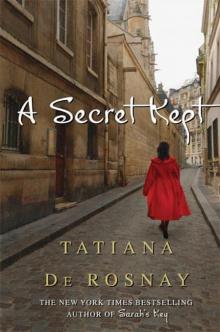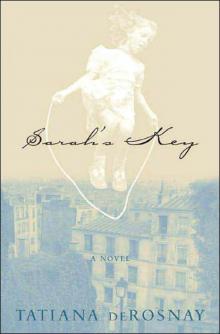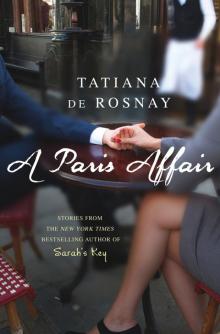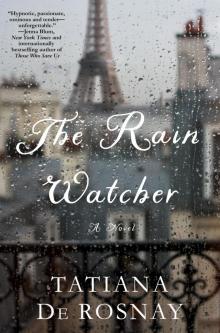- Home
- Tatiana de Rosnay
Sarah's Key
Sarah's Key Read online
Sarah's Key
Sarah's Key
Tatiana de Rosnay
St. Martin's Press New York
This is a work of fiction. All of the characters, organizations, and events portrayed in this novel are either products of the author's imagination or are used fictitiously.
SARAH'S KEY. Copyright (c) 2007 by Tatiana de Rosnay. All rights reserved. Printed in the United States of America. No part of this book may be used or reproduced in any manner whatsoever without written permission except in the case of brief quotations embodied in critical articles or reviews. For information, address St. Martin's Press, 175 Fifth Avenue, New York, N.Y. 10010
www.stmartins.com
Nota bene: Pages 184 and 185 contain excerpts of Prime Minister Jean-Pierre Raffarin's speech during the 60th commemoration of the Vel' d'Hiv' roundup, on July 21, 2002.
Library of Congress Cataloging-in-Publication Data
Rosnay, Tatiana de, 1961-
Sarah's key / Tatiana de Rosnay.--1st ed.
p. cm.
ISBN-13: 978-0-312-37083-1
ISBN-10: 0-312-37083-0
1. Jews--France--Fiction. 2. World War, 1939-1945--France--Anniversaries, etc.--Fiction. 3. Americans--France--Fiction. 4. Women authors--Fiction. 5. Family secrets--Fiction. 6. France--History--German occupation, 1940-1945--Fiction. 7. Paris (France)--Fiction.
PR9105.9.R66 S27 2007
823'.914--dc22
2006034536
First Edition: June 2007
10 9 8 7 6 5 4 3 2 1
To Stella, my mother
To my beautiful, rebellious Charlotte
In memory of Natacha, my grandmother (1914-2005)
Author's Note
The characters in this novel are entirely fictitious. But several of the events described are not, especially those that occurred in Occupied France during summer of 1942, and in particular the great Velodrome d'Hiver roundup, which took place on July 16, 1942, in the heart of Paris.
This is not a historical work and has no intention of being one. It is my tribute to the children of the Vel' d'Hiv'. The children who never came back. And the ones who survived to tell.
My God! What is this country doing to me? Because it has rejected me, let us consider it coldly, let us watch it lose its honor and its life.
--IRENE NEMIROVSKY, Suite Francaise (1942)
Tyger! Tyger! burning bright
In the forests of the night,
What immortal hand or eye
Could frame thy fearful symmetry?
--WILLIAM BLAKE, Songs of Experience
Paris, July 1942
T
HE GIRL WAS THE first to hear the loud pounding on the door. Her room was closest to the entrance of the apartment. At first, dazed with sleep, she thought it was her father, coming up from his hiding place in the cellar. He'd forgotten his keys, and was impatient because nobody had heard his first, timid knock. But then came the voices, strong and brutal in the silence of the night. Nothing to do with her father. "Police! Open up! Now!"
The pounding took up again, louder. It echoed to the marrow of her bones. Her younger brother, asleep in the next bed, stirred. "Police! Open up! Open up!" What time was it? She peered through the curtains. It was still dark outside.
She was afraid. She remembered the recent, hushed conversations she had overheard, late at night, when her parents thought she was asleep. She had crept up to the living room door and she had listened and watched from a little crack through the panel. Her father's nervous voice. Her mother's anxious face. They spoke their native tongue, which the girl understood, although she was not as fluent as them. Her father had whispered that times ahead would be difficult. That they would have to be brave and very careful. He pronounced strange, unknown words: "camps," "roundup, a big roundup," "early morning arrests," and the girl wondered what all of it meant. Her father had murmured that only the men were in danger, not the women, not the children, and that he would hide in the cellar every night.
He had explained to the girl in the morning that it would be safer if he slept downstairs, for a little while. Till "things got safe." What "things," exactly? thought the girl. What was "safe"? When would things be "safe" again? She wanted to find out what he had meant by "camp" and "roundup," but she worried about admitting she had eavesdropped on her parents, several times. So she hadnot dared ask him.
"Open up! Police!"
Had the police found Papa in the cellar, she asked herself. Was that why they were here, had the police come to take Papa to the places he had mentioned during those hushed midnight talks: the "camps," far away, out of the city?
The girl padded fast on silent feet to her mother's room, down the corridor. Her mother awoke the minute she felt a hand on her shoulder.
"It's the police, Maman," the girl whispered. "They're banging on the door."
Her mother swept her legs from under the sheets, brushed her hair out of her eyes. The girl thought she looked tired, old, much older than her thirty years.
"Have they come to take Papa away?" pleaded the girl, her hands on her mother's arms. "Have they come for him?"
The mother did not answer. Again the loud voices down the hallway. The mother swiftly put a dressing gown over her night dress, then took the girl by the hand and went to the door. Her hand was hot and clammy, like a child's, the girl thought.
"Yes?" the mother said timidly, without opening the latch.
A man's voice. He shouted her name.
"Yes, Monsieur, that is me," she answered. Her accent came out strong, almost harsh.
"Open up. Immediately. Police."
The mother put a hand to her throat and the girl noticed how pale she was. She seemed drained, frozen. As if she could no longer move. The girl had never seen such fear on her mother's face. She felt her mouth go dry with anguish.
The men banged again. The mother opened the door with clumsy, trembling fingers. The girl winced, expecting to see green-gray suits.
Two men stood there. One was a policeman, wearing his dark blue knee-length cape and a high, round cap. The other man wore a beige raincoat. He had a list in his hand. Once again, he said the woman's name. And the father's name. He spoke perfect French. Then we are safe, thought the girl. If they are French, and not German, we are not in danger. If they are French, they will not harm us.
The mother pulled her daughter close to her. The girl could feel the woman's heart beating through her dressing gown. She wanted to push her mother away. She wanted her mother to stand up straight and look at the men boldly, to stop cowering, to prevent her heart from beating like that, like a frightened animal's. She wanted her mother to be brave.
"My husband is . . . not here," stuttered the mother. "I don't know where he is. I don't know."
The man with the beige raincoat shoved his way into the apartment.
"Hurry up, Madame. You have ten minutes. Pack some clothes. Enough for a couple of days."
The mother did not move. She stared at the policeman. He was standing on the landing, his back to the door. He seemed indifferent, bored. She put a hand on his navy sleeve.
"Monsieur, please-," she began.
The policeman turned, brushing her hand away. A hard, blank expression in his eyes.
"You heard me. You are coming with us. Your daughter, too. Just do as you are told."
Paris, May 2002
B
ERTRAND WAS LATE, AS usual. I tried not to mind, but I did. Zoe lolled back against the wall, bored. She looked so much like her father, it sometimes made me smile. But not today. I glanced up at the ancient, tall building. Mame's place. Bertrand's grandmother's old apartment. And we were going to live there. We were going to leave the boulevard du Montparnasse, its noisy traffic, incessant ambulances due to t
hree neighboring hospitals, its cafes and restaurants, for this quiet, narrow street on the right bank of the Seine.
The Marais was not an arrondissement I was familiar with, although I did admire its ancient, crumbling beauty. Was I happy about the move? I wasn't sure. Bertrand hadn't really asked my advice. We hadn't discussed it much at all, in fact. With his usual gusto, he had gone ahead with the whole affair. Without me.
"There he is," said Zoe. "Only half an hour late."
We watched Bertrand saunter up the street with his particular, sensual strut. Slim, dark, oozing sex appeal, the archetypal Frenchman. He was on the phone, as usual. Trailing behind him was his business associate, the bearded and pink-faced Antoine. Their offices were on the rue de l'Arcade, just behind the Madeleine. Bertrand had been part of an architectural firm for a long time, since before our marriage, but he had started out on his own, with Antoine, five years ago.
Bertrand waved to us, then pointed to the phone, lowering his eyebrows and scowling.
"Like he can't get that person off the phone," scoffed Zoe. "Sure."
Zoe was only eleven, but it sometimes felt like she was already a teenager. First, her height, which dwarfed all her girlfriends--as well as her feet, she would add grimly--and then a precocious lucidity that often made me catch my breath. There was something adult about her solemn, hazel gaze, the reflective way she lifted her chin. She had always been like that, even as a little child. Calm, mature, sometimes too mature for her age.
Antoine came to greet us while Bertrand went on with his conversation, just about loud enough for the entire street to hear, waving his hands in the air, making more faces, turning around from time to time to make sure we were hanging on to every word.
"A problem with another architect," explained Antoine with a discreet smile.
"A rival?" asked Zoe.
"Yes, a rival," replied Antoine.
Zoe sighed.
"Which means we could be here all day," she said.
I had an idea.
"Antoine, do you by any chance have the key to Madame Tezac's apartment?"
"I do have it, Julia," he said, beaming. Antoine always spoke English to my French. I suppose he did it to be friendly, but it secretly annoyed me. I felt like my French still wasn't any good after living here all these years.
Antoine flourished the key. We decided to go up, the three of us. Zoe punched out the digicode at the door with deft fingers. We walked through the leafy, cool courtyard to the elevator.
"I hate that elevator," said Zoe. "Papa should do something about it."
"Honey, he's only redoing your great-grandmother's place," I pointed out. "Not the whole building."
"Well, he should," she said.
As we waited for the elevator, my mobile phone chirped out the Darth Vader theme. I peered at the number flashing on my screen. It was Joshua, my boss.
I answered, "Yup?"
Joshua was to the point. As usual.
"Need you back by three. Closing July issues. Over and out."
"Gee whiz," I said pertly. I heard a chuckle on the other end of the line before he hung up. Joshua always seemed to like it when I said gee whiz. Maybe it reminded him of his youth. Antoine seemed amused by my old-fashioned Americanisms. I imagined him hoarding them up, then trying them out with his French accent.
The elevator was one of those inimitable Parisian contraptions with a diminutive cabin, hand-maneuvered iron screen, and double wooden doors that inevitably swung in your face. Squashed between Zoe and Antoine--a trifle heavy-handed with his Vetiver scent--I caught a glimpse of my face in the mirror as we glided up. I looked as eroded as the groaning lift. What had happened to the fresh-faced belle from Boston, Mass.? The woman who stared back at me was at that dreaded age between forty-five and fifty, that no-man's land of sag, oncoming wrinkle, and stealthy approach of menopause.
"I hate this elevator, too," I said grimly.
Zoe grinned and pinched my cheek.
"Mom, even Gwyneth Paltrow would look like hell in that mirror."
I had to smile. That was such a Zoe-like remark.
T
HE MOTHER BEGAN TO sob, gently at first, then louder. The girl looked at her, stunned. In all her ten years, she had never seen her mother cry. Appalled, she watched the tears trickle down her mother's white, crumpled face. She wanted to tell her mother to stop crying, she could not bear the shame of seeing her mother snivel in front of these strange men. But the men paid no attention to the mother's tears. They told her to hurry up. There was no time to waste.
In the bedroom, the little boy slept on.
"But where are you taking us?" pleaded her mother. "My daughter is French, she was born in Paris, why do you want her too? Where are you taking us?"
The men spoke no more. They loomed over her, menacing, huge. The mother's eyes were white with fear. She went to her room, sank down on the bed. After a few seconds, she straightened her back and turned to the girl. Her voice was a hiss, her face a tight mask.
"Wake your brother. Get dressed, both of you. Take some clothes, for him and you. Hurry! Hurry, now!"
Her brother went speechless with terror when he peeped through the door and saw the men. He watched his mother, disheveled, sobbing, trying to pack. He mustered all the strength he had in his four-year-old body. He refused to move. The girl cajoled him. He would not listen. He stood, motionless, his little arms folded over his chest.
The girl took off her night dress, grabbed a cotton blouse, a skirt. She slipped her feet into shoes. Her brother watched her. They could hear their mother crying from her room.
"I'm going to our secret place," he whispered.
"No!" she urged. "You're coming with us, you must."
She grabbed him, but he wriggled out of her grasp and slithered into the long, deep cupboard hidden in the surface of the wall of their bedroom. The one they played hide-and-seek in. They hid there all the time, locked themselves in, and it was like their own little house. Maman and Papa knew about it, but they always pretended they didn't. They'd call out their names. They'd say with loud, bright voices, "But where did those children go? How strange, they were here a minute ago!" And she and her brother would giggle away with glee.
They had a flashlight in there and some cushions and toys and books, even a flask of water that Maman would fill up every day. Her brother couldn't read yet, so the girl would read Un Bon Petit Diable out loud to him. He loved the tale of the orphan Charles and the terrifying Madame Mac'miche and how Charles got back at her for all her cruelty. She would read it to him over and over again.
The girl could see her brother's small face peeking out at her from the darkness. He had his favorite teddy bear clutched to him, he was not frightened anymore. Maybe he'd be safe there, after all. He had water and the flashlight. And he could look at the pictures in the Comtesse de Segur book. His favorite was the one of Charles's magnificent revenge. Maybe she should leave him there for the moment. The men would never find him. She would come back to get him later in the day when they were allowed to go home again. And Papa, still in the cellar, would know where the boy was hiding, if ever he came up.
"Are you afraid in there?" she said softly, as the men called out for them.
"No," he said. "I'm not afraid. You lock me in. They won't get me."
She closed the door on the little white face, turned the key in the lock. Then she slipped the key into her pocket. The lock was hidden by a pivoting device shaped like a light switch. It was impossible to see the outline of the cupboard in the paneling of the wall. Yes, he'd be safe there. She was sure of it.
The girl murmured his name and laid her palm flat on the wooden panel.
"I'll come back for you later. I promise."
W
E ENTERED THE APARTMENT, fumbled with light switches. Nothing happened. Antoine opened a couple of shutters. The sun poured in. The rooms were bare, dusty. Without furniture, the living room seemed immense. The golden rays slanted in through the long, gr
imy windowpanes, dappling the deep brown floorboards.
I looked around at the empty shelves, the darker squares on the walls where the beautiful paintings used to hang, the marble chimney where I remembered so many winter fires burning, and Mame holding out her delicate, pale hands to the warmth of the flames.
I went to stand by one of the windows and looked down at the quiet, green courtyard. I was glad Mame left before she ever got to see her empty apartment. It would have upset her. It upset me.
"Still smells of Mame," said Zoe. "Shalimar."
"And of that awful Minette," I said, turning up my nose. Minette had been Mame's last pet. An incontinent Siamese.
Antoine glanced at me, surprised.
"The cat," I explained. I said it in English this time. Or course I knew that la chatte was the feminine for "cat," but it could also mean "pussy." The last thing I wanted was having Antoine guffaw at some dubious double entendre.
Antoine appraised the place with a professional eye.
"The electrical system is ancient," he remarked, pointing at the old-fashioned, white porcelain fuses. "And the heating as well."
The oversized radiators were black with dirt, as scaly as a reptile.
"Wait till you see the kitchen and the bathrooms," I said.
"The bathtub has claws," said Zoe. "I'm going to miss those."
Antoine examined the walls, knocking on them.
"I suppose you and Bertrand want to redo it completely?" he asked, looking at me.
I shrugged.
"I don't know what he wants to do exactly. It was his idea, taking on this place. I wasn't so hot about coming here. I wanted something more . . . practical. Something new."
-->

 A Secret Kept
A Secret Kept Sarah's Key
Sarah's Key A Paris Affair
A Paris Affair The Other Story
The Other Story The House I Loved
The House I Loved The Rain Watcher
The Rain Watcher